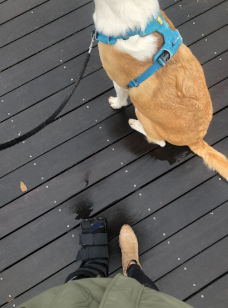“Weighing yourself is a disordered and ineffective coping strategy for managing the anxiety you feel about your body”. -Emily Fonnesbeck, RD
When I was younger, I lived on the scale. I’d wake up in the morning and weigh myself before I even brushed my teeth. Stepping on the scale was the very first thing I would think of each day. That wasn’t the only time I’d weigh myself, either. I’d weigh myself before I showered and after, before and after I ate or went for a run, and then I’d weigh myself before bed. I probably weighed myself at least three times a day and I’m sure there were days I weighed myself as many as six or seven times. I weighed myself constantly in hopes of seeing a smaller, more acceptable number. There was always a number in my head, a goal I was striving for, and I thought if I ever saw that number, it could all stop. I thought if the number was small enough, I could give myself permission to stop obsessively weighing myself, stop counting calories, stop cutting out food groups and skipping meals, and stop punishing myself when I slipped up and ate something “bad”. I thought that if I reached the right number on the scale, I could let go of all my stress and anxiety around food and my body and I would finally be happy. Now I know how wrong that was. The number on the scale was never going to bring me happiness.
The scale, and the number on it, controlled me. No matter how much I weighed, I’d convince myself I needed to weigh less. As long as I was weighing myself, I was bound to a number that was certain to make me unhappy.
If at 16 or 18 or 20, I saw an image of an elite runner standing on a scale and I could see her weight, I have no doubt I would I have been devastated. The eating disorder and body dysmorphia I was already struggling with would have been intensified in an instant. This is why now, a few years wiser and more recovered from my eating disorder, when I see an elite runner who has built a platform as a body acceptance advocate share an image of herself on a scale where you can easily see her weight, I feel a strong responsibility to speak out.
You can promote body acceptance or advertise for a scale. You can’t do both.
I feel extremely grateful to say that I am no longer triggered when I see someone else’s weight, but I know how deeply this can impact others, especially vulnerable young women and girls, because I’ve been there. If you gain popularity and a platform by speaking out against the idea that you need to be rail thin to be fast, then you have a responsibility to your supporters to use that platform wisely. If you create a message intended to help a following of vulnerable young women and girls, you owe it to those followers to not promote messages or products that can lead directly to harmful thinking and behaviors.
When speaking out against this athlete’s promotion of a scale and the carelessness of posting her weight, I received a lot of criticism. I was told that in requesting she be more conscious of how sharing her weight can harm her followers, I was being controlling. I was told that it’s unreasonable to ask people to censor their posts so that others aren’t triggered and that anyone triggered by someone’s weight is “bound to fail”. I was told that I was projecting my own issues onto the post and that if I see this post as negative, I need to take a look in the mirror. I was told that if someone is “that sensitive to the number on a scale, they should be the one to moderate what they ingest”. These comments are so incredibly stigmatizing and it pains me to think about how many people are potentially being hurt by reading them.
So let’s take a look at some of this criticism. Is it too much to ask someone to censor their posts so that others aren’t triggered? Maybe. But if that person claims they are sharing their journey to help people struggling with body image, I really, really don’t think it is. In fact, I don’t see it as censorship at all. It’s a call to be more responsible, and to stay true to your message. If you want to post numbers like weight and bod pod results, fine, but then you can’t also say you want to help people struggling with body image. Posting those numbers does nothing but harm individuals struggling, along with solidifying the idea that runners have to be lean, and a lower than average weight. Many people make the argument that it’s refreshing to see an athlete that “weighs more than most elites”, but the fact of the matter is, she still weighs far less than the average American woman and sharing her weight opens up a breeding zone for comparison. If you truly want to help people struggling with disordered thoughts and behaviors around food and their body, then refraining from posting your weight shouldn’t be much of an ask. If you truly want to promote body acceptance, be more aware of what triggers body dissatisfaction.
Next, am I projecting “my issues” onto the post? Totally. I’m projecting because I know 30 million people suffer with eating disorders in the US and that eating disorders are the deadliest mental illness. I’m sharing “my issues” with the hope that others struggling with the same thing can see they are not alone. This line of thinking—this “you’re projecting your own issues, look in the mirror”—is why the stigma around eating disorders and mental illness continues to exist. It’s why people continue to suffer in silence.
Now, let’s address the idea that if you’re triggered by a number on a scale it’s your responsibility to moderate the content you ingest. Sure, if you are struggling with an eating disorder or body dysmorphia and you are aware of your illness, it would be in your best interest to moderate what you ingest to the extent that you’re able. But if you’re following a “body positive” account, shouldn’t this content be considered safe? If an account is truly body positive, there won’t be content triggering to those with disordered eating or body image concerns. Anyone working to help individuals who are struggling, and doing a good job of it, is mindful of what they post and any potential harm their words, images, or numbers could cause. Of course, this is all if you already recognize you’re struggling, which most people don’t and in those (read: most) cases, this type of content will just fuel the fire. Again, I know because I’ve been there.
Finally, if you are triggered by a number, be it weight or something else, you are not bound to fail. I’m honestly not sure what the failure we’re referring to here is, but I know you’re not bound for it. If you are triggered by an elite athlete posting their weight there is nothing wrong with you, you are human. (Even if you didn’t feel triggered by it, but feel upset about it like I do, you’re human.) We live in a culture that assigns worth to numbers like size and weight, it’s not at all surprising if seeing these numbers brings you anxiety and stress. These numbers are meaningless in that they don’t actually tell us anything about a person or a person’s health, but unfortunately in our society, they matter a lot. It’s easy to tell someone not to look or not to care about someone else’s weight, but it’s a lot more difficult to actually ignore these numbers in practice, especially if you’re battling a mental illness. If we want to move our society forward in a way that values humans over bodies, the comparison-breeding numbers need to go.
If you’re following accounts that trigger you or make you feel bad, its OK to unfollow them. Unfollow them even if you think they are *supposed* to be helping you. It’s OK to be skeptical, not every post with #bodypositivity is useful, sometimes it’s just a wolf in sheep’s clothing. You know what’s best for you and if someone is praised for their transparency and bravery but you still find their message triggering, know that your feelings are valid and it’s on them to fix it rather than on you to get over it.
As always, you are not alone and you deserve any help and support you need. You also deserve actual body acceptance, and resources that follow through on helping you with it.
If you’re struggling with disordered thoughts or behaviors around food, your body, or exercise, help is available. Visit the NEDA Help & Support Page Here or call the NEDA Hotline: (800) 931-2237




